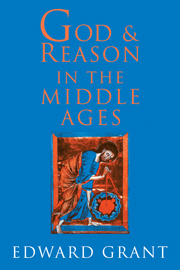Book contents
- Frontmatter
- Contents
- Acknowledgments
- Introduction
- 1 The Emergence of a Transformed Europe in the Twelfth Century
- 2 Reason Asserts Itself: The Challenge to Authority in the Early Middle Ages to 1200
- 3 Reason Takes Hold: Aristotle and the Mediveal University
- 4 Reason in Action: Logic in the Faculty of Arts
- 5 Reason in Action: Natural Philosophy in the Faculty of Arts
- 6 Reason in Action: Theology in the Faculty of Theology
- 7 The Assault on the Middle Ages
- Conclusion: The Culture and Spirit of “Poking Around”
- Bibliography
- Index
6 - Reason in Action: Theology in the Faculty of Theology
Published online by Cambridge University Press: 28 August 2009
- Frontmatter
- Contents
- Acknowledgments
- Introduction
- 1 The Emergence of a Transformed Europe in the Twelfth Century
- 2 Reason Asserts Itself: The Challenge to Authority in the Early Middle Ages to 1200
- 3 Reason Takes Hold: Aristotle and the Mediveal University
- 4 Reason in Action: Logic in the Faculty of Arts
- 5 Reason in Action: Natural Philosophy in the Faculty of Arts
- 6 Reason in Action: Theology in the Faculty of Theology
- 7 The Assault on the Middle Ages
- Conclusion: The Culture and Spirit of “Poking Around”
- Bibliography
- Index
Summary
THE NEW THEOLOGY
In the thirteenth century, theology became a professional discipline taught in independent faculties of theology at the universities of Paris and Oxford, the most important schools of theology during the thirteenth and fourteenth centuries. The faculties of theology controlled the content of theological education and the granting of the master's degree in theology. From the early centuries of Christianity, theologians always regarded their discipline as superior to that of any secular subject. Secular learning was viewed traditionally as the handmaid of theology and, therefore, subordinate to it. After all, the objective of theology was to interpret and explicate the mysteries of the faith and the meaning of Sacred Scripture. But what theology lacked until the thirteenth century was knowledge of its place in the scheme of learning. How did it relate to other disciplines, especially logic and natural philosophy?
Is Theology a Science?
In the course of the thirteenth century, many theologians, beginning with Alexander of Hales and continuing on through St. Thomas Aquinas and many others, discussed the question of “whether theology is a science.” In posing this question, theologians were inquiring whether theology is a science in the Aristotelian sense of science, namely, science as demonstrative knowledge derived from premises that are “true, necessary, certain, immediate, and appropriate to the phenomenon to be explained.”
- Type
- Chapter
- Information
- God and Reason in the Middle Ages , pp. 207 - 282Publisher: Cambridge University PressPrint publication year: 2001



